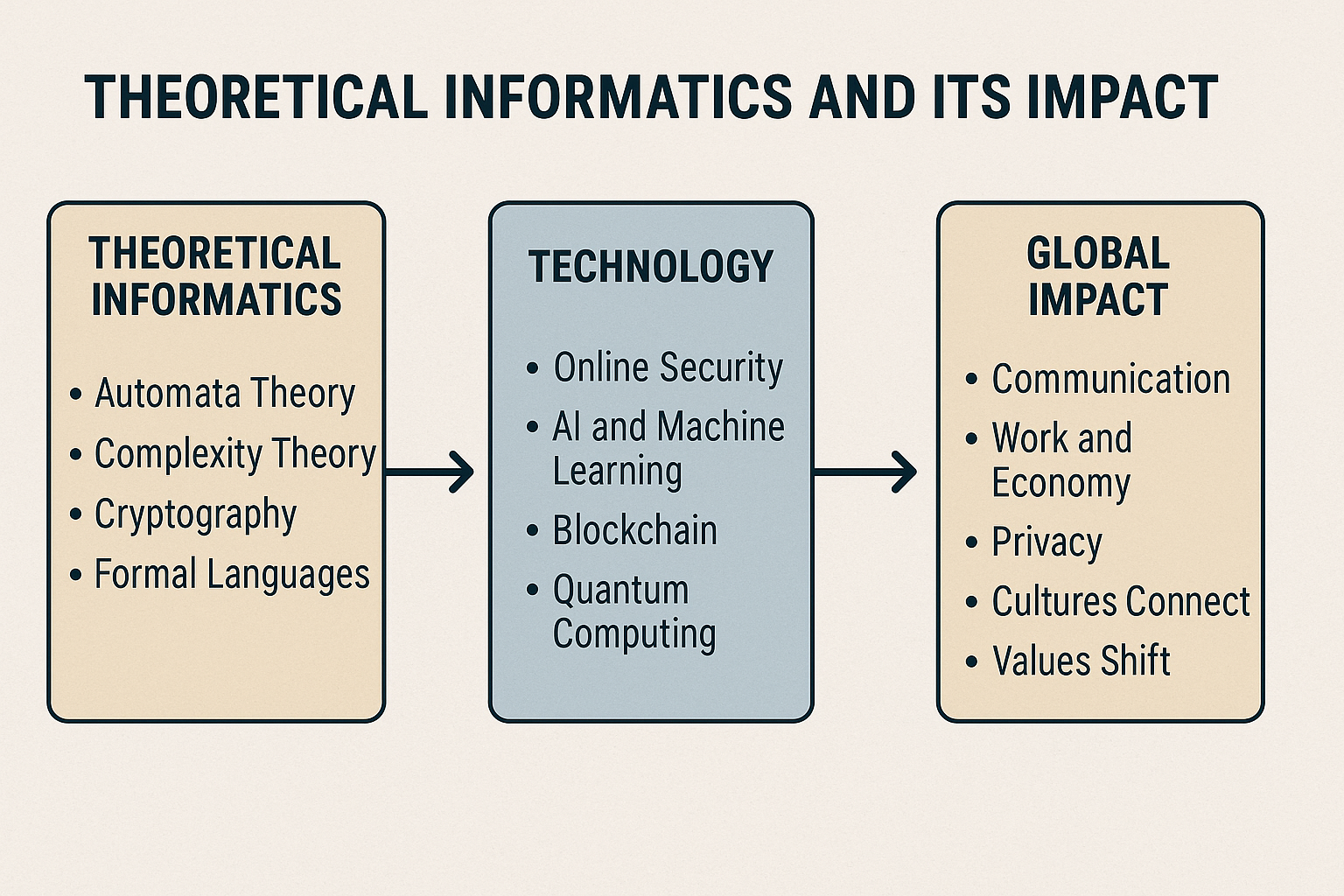From Equations to Everyday Life: How Theoretical Informatics Shapes Our World
 When most people think about technology, they picture smartphones, AI assistants, streaming services, or social media. Few think about the invisible mathematical ideas that make all of this possible.
When most people think about technology, they picture smartphones, AI assistants, streaming services, or social media. Few think about the invisible mathematical ideas that make all of this possible.
Those ideas belong to a field called theoretical informatics—the “blueprint layer” of computer science that studies the fundamental principles of information, algorithms, and computation.
“The information power theory haas the means to collect, process, and distribute information (and the technology to do so) can influence economies, politics, and culture on a massive scale.” Alvin Toffler, futurist and author of Powershift (1990
It might sound abstract, but without theatrical Infirmatics we wouldn’t have the internet, online banking, GPS, artificial intelligence, or even your favorite video game. And while the term may seem distant from everyday life, its influence reaches into how we shop, how we communicate, how we learn, and even how we think.

What Is Theoretical Informatics?
At its heart, theoretical informatics is about understanding the rules of the game for information processing.
It doesn’t focus on building apps or fixing your Wi-Fi, but en extinction of these by exploring the deep questions that determine what computers—whether human-made machines or hypothetical models—can and cannot do and how it can influence people (soft power).Tecnology
It asks questions like:
- What kinds of problems can we solve with a computer, no matter how powerful?
- If something can be solved, what is the most efficient way to do it?
- How can we keep information safe in a world where everything is connected?
To answer these, researchers work in several key areas:
- Automata theory – exploring simplified “machines” that mimic the way computers process information. Example: When you get an email and your spam filter instantly decides if it’s “spam” or “safe,” that’s an application of automata theory in action.
- Complexity theory – figuring out the time and memory needed to solve a problem. Example: Google Maps calculating the fastest route for millions of users at once without crashing your phone.
- Cryptography – the mathematics that allows secure communication over the internet. Example: Your WhatsApp chats being end-to-end encrypted so that even the company itself can’t read them.
- Formal languages – defining how programming languages and data formats are structured so computers can interpret them. Example: Every time you load a web page, your browser uses formal grammar rules (HTML, CSS, JavaScript) to understand how to display it.
From Theory to Technology
Zbigniew Brzezinski, former U.S. National Security Advisor, wrote in Between Two Ages (1970):
“In the technetronic society, the trend would seem to be toward the aggregation of the individual support of millions of uncoordinated citizens… and the harnessing of information for control purposes.”
While theoretical informatics may feel like pure mathematics, its breakthroughs often become the foundation of the technologies we rely on every day. The process is a bit like building a bridge: first, you design it on paper using physics and engineering principles, and only later do you see cars driving across it.
What begins as an abstract idea in a research paper can eventually change entire industries:
- Online security – The RSA encryption method, invented in 1977, was purely theoretical for years. Today, it protects online shopping, banking, and any secure login you make.
- AI and machine learning – Deep learning algorithms use concepts from probability and optimization that were formalized decades ago. That’s what powers Netflix’s recommendations, Google Translate, and facial recognition on your phone.
- Blockchain – The idea of “hash functions” and distributed consensus came from theoretical computer science. Now they support cryptocurrencies like Bitcoin and secure medical record storage.
- Quantum computing – Quantum algorithms like Shor’s algorithm (1994) could one day crack current encryption systems, which is why scientists are racing to build “post-quantum” security before the hardware catches up.
Without these theoretical foundations, many of today’s most celebrated “innovations” would simply be impossible.
The Human and Cultural Impact
The influence of theoretical informatics doesn’t stop at technology—it ripples through society, shaping how we live, work, and connect with one another. The tools it makes possible can change our habits, our opportunities, and even our cultural values.
Communication has been transformed by algorithms that determine what content we see, which stories go viral, and how we interact with people across the globe. Example: The TikTok “For You” page uses a recommendation algorithm to predict what you’ll watch next, often keeping people scrolling for hours.
In the workplace, automation driven by algorithmic design changes the types of jobs available and the skills we need. Example: In logistics, Amazon’s warehouse robots optimize product movement in real time, reducing delivery times but also reshaping human labor roles.
On the privacy front, cryptography protects personal and financial information, allowing billions of people to exchange data securely over open networks. Example: When you see the little padlock icon in your browser, it means your connection is encrypted using protocols built from theoretical informatics research.
In cultural terms, translation algorithms and AI-powered platforms help ideas, music, and news travel across language barriers in seconds, fueling global exchange. Example: A K-pop song released in Seoul can be instantly subtitled, remixed, and shared worldwide within hours.
These changes can be summarized in key areas:
- How We Communicate – Algorithms shape conversations, trends, and even political landscapes.
- How We Work – Automation redefines industries and demands new skill sets.
- How We Protect Privacy – Encryption keeps data safe, even in open networks.
- How Cultures Connect – Instant translation and content sharing create a digital cultural crossroads.
- How Values Shift – Ethical debates emerge over AI fairness, transparency, and control.
A Global Force, Not Just a Technical One
Theoretical informatics is not just an academic exercise—it is a force that influences economics, politics, and culture on a global scale. The technologies it makes possible have accelerated globalization, transforming how economies function, how cultures exchange ideas, and how societies address challenges.
It powers economic growth by enabling new industries, from e-commerce to autonomous vehicles. Example: Ride-hailing apps like Uber are built on algorithms that match drivers and riders in real time, minimizing wait times worldwide.
It fosters cultural exchange by allowing creators and audiences to interact across borders instantly. Example: YouTube’s recommendation system introduces viewers to content from entirely different cultures they might never have encountered otherwise.
But it also raises urgent questions about misinformation, digital rights, and the concentration of technological power. Example: Algorithm-driven news feeds can unintentionally promote misinformation if engagement is prioritized over accuracy.
Ultimately, the math and logic behind theoretical informatics aren’t confined to textbooks—they’re woven into the fabric of modern life. Understanding this hidden foundation helps us see technology not as magic, but as the product of decades of careful thinking, problem-solving, and imagination.
Notable Quotes
1. From Babylon 5
-
Dr. Stephen Franklin:
“He who controls information controls the world.”
This memorable line comes from the science-fiction TV show Babylon 5 and captures the essence of the concept in a direct, dramatic way. ThoughtCo+3Quotes+3Quote Investigator+3
2. George Orwell, 1984
-
Famously:
“Those who control the present, control the past; and those who control the past control the future.”
This quote underscores how influence over narratives and facts empowers control not just over memory, but over the path forward. GoodreadsEd Latimore+1
3. Tom Clancy
-
He writes:
“The control of information is something the elite always does, particularly in a despotic form of government. Information—knowledge—is power. If you can control information, you can control people.”
This adds a real-world, political lens to how elites consolidate influence. brainyquote.com



